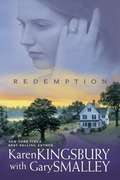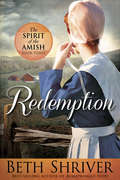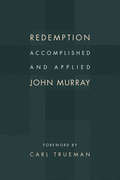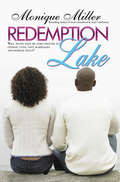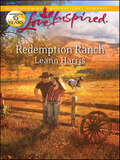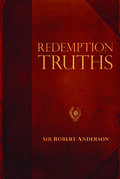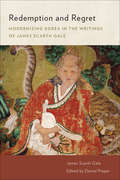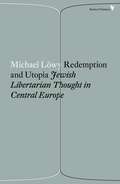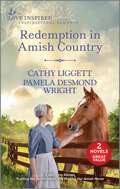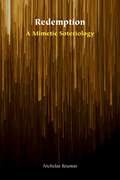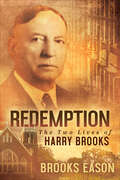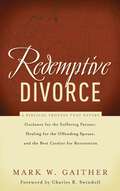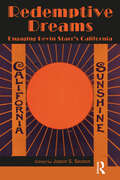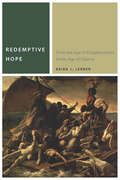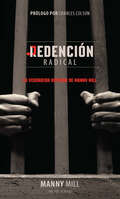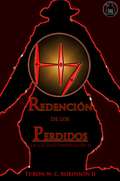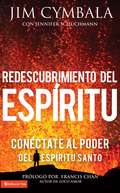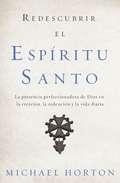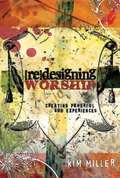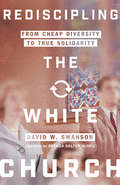- Table View
- List View
Redemption (Redemption Series #1)
by Gary Smalley Karen KingsburyThe 5 volume Redemption Series is set in Bloomington, Indiana. The series follows the lives of John and Elizabeth Baxter and their five adult children, each of whom is trying to find his or her way in life--sometimes with God, sometimes without. The series will follow the paths of pain and pleasure, tragedy and tears that take place in the lives of Brooke, Kari, Ashley, Erin, and Luke. The Baxters, their spouses, and friends experience the same struggles each of us faces--the longing for lasting love, the hurt of broken relationships, the fear of the unknown, questions about the future, the sorrow of loss, and the joy of restored relationships. Over time you'll come to know the Baxter family as if they were your neighbors or members of your own family. The Redemption Series illustrates the relational teachings of Gary Smalley in a way that is changing lives across the world. In the opening Book, Redemption, when Kari Baxter Jacobs finds out that her college professor husband Tim is involved in an adulterous relationship with college student Angela Manning and wants a divorce, she decides she will love him and remain faithful to her marriage at all costs. This book shows how God can redeem seemingly hopeless relationships, and it illustrates one of Gary Smalley's key messages: Love is a decision.
Redemption (Spirit of the Amish #3)
by Beth ShriverWhen Dr. Daniel Kauffman asks the headstrong Fannie Hochstetler to assist him in a clinic he has set up in the Amish community, she reluctantly agrees. Tired of her mother&’s attempts to plan her life, Fannie sees the offer as an opportunity to become a midwife, even if that means working with a man asinsufferable as Daniel. Daniel isn&’t thrilled to be working with Fannie either, but he needs her help in order to split his time between the hospital and the community. And she&’s a natural with the patients. But the longer he works with Fannie, the more he misses the community he left all those years ago—and the harder it becomes for him to resist the tug to return. Will Daniel be able to find redemption and the love he longs for?
Redemption Accomplished and Applied
by John MurrayNew issue of a theological classic on the atonementOriginally published in 1955 and reprinted dozens of times over the years, John Murray’s Redemption Accomplished and Applied systematically explains the two sides of redemption -- its accomplishment through Christ’s atonement and its application to the lives of believers.Murray explores the biblical passages dealing with the necessity, nature, perfection, and extent of the atonement in order to establish its relationship to our justification, sanctification, and glorification. He goes on to identify the distinct steps in the Bible’s presentation of how the redemption accomplished by Christ is applied progressively to the life of the redeemed, including the role of faith and repentance.Concise, precise, and accessible, Murray’s classic doctrinal study will now reach and benefit a new generation of readers.
Redemption Accomplished and Applied
by John MurrayNew issue of a theological classic on the atonementOriginally published in 1955 and reprinted dozens of times over the years, John Murray’s Redemption Accomplished and Applied systematically explains the two sides of redemption -- its accomplishment through Christ’s atonement and its application to the lives of believers.Murray explores the biblical passages dealing with the necessity, nature, perfection, and extent of the atonement in order to establish its relationship to our justification, sanctification, and glorification. He goes on to identify the distinct steps in the Bible’s presentation of how the redemption accomplished by Christ is applied progressively to the life of the redeemed, including the role of faith and repentance.Concise, precise, and accessible, Murray’s classic doctrinal study will now reach and benefit a new generation of readers.
Redemption Hymns
by Lindsay G SmithThis is a nondenominational words-only collection of 703 hymns and songs published in New Zealand in 2009. It includes such hymns as Standing on the Promises, His Eye Is on the Sparrow and many other popular hymns with rousing refrains affirming the Christian faith. You'll find 25 hymns by the blind hymn writer Fanny J. Crosby including Blessed Assurance. There's a topical index and an index of first lines and refrains. As with other hymnbooks on Bookshare, this too has DAISY markup for each hymn at level 1. In a BRF file, Bookshare software will create a lengthy table of contents followed by the text of the hymn book. For other hymn collections on Bookshare see also Christian Hymns; The New Believers Hymn Book; Gospel Hymn Book; The United Methodist Hymnal; Glory to God (Presbyterian); Evangelical Lutheran Worship (ELCA); and Lutheran Servicebook: Psalms and Hymns (Missouri Synod). For texts of cantatas by Johann Sebastian Bach, see The Church Cantatas of J. S. Bach by Alec Robinson (with commentary), and Johann Sebastian Bach: The Complete Cantatas in German-English translations by Richard Stokes.
Redemption Lake
by Monique MillerDuring a weeklong exclusive marriage retreat, three couples seek spiritual intervention and guidance. Secrets have been exposed, and all has hit the fan. Journey with these couples as they travel on the road to mending and rebuilding their torn relationships. Lives will forever be changed, and some souls will be redeemed. But can these couples really forgive and forget?
Redemption Ranch
by Leann HarrisA former foster kid and army soldier, Tyler Lynch doesn't trust easily. In fact, the shy mutt who never leaves his side is his sole confidant. Tyler knows what it's like to be a child in need, so he goes to work at an equine therapy ranch.He's instantly surprised by the way lovely volunteer Beth McClure seems to understand scared children-and stubborn cowboys. Beth's tenderness even wins his dog's trust. But when Tyler faces his greatest fear, it'll take Beth's love-and one brave boy-to open the most guarded of hearts.
Redemption Songs: 1000 Hymns & Choruses
by CollinsThis is a collection of 1,000 hymns, words only, many originating in the 19th century, projecting a life of holiness and sacrifice but also joy. More than 600 hymns have refrains which are often expressions of praise and thanks to God. As with other hymnbooks on Bookshare, this has DAISY markup which allows you to move from hymn to hymn. In a BRF file, Bookshare software creates a lengthy table of contents followed by the text of the hymn book. For hymnals on Bookshare see also: Glory to God (Presbyterian); Evangelical Lutheran Worship (ELCA); Lutheran Servicebook: Psalms and Hymns (Missouri Synod); The United Methodist Hymnal; Chalice Hymnal (Disciples of Christ); and The Revised English Hymnal (Anglican Communion). For nondenominational hymn collections, see the following: Christian Hymns; Gospel Hymn Book; Hymns for Christian Service and Worship; Hymns of Faith; Hymns of Light and Love; Redemption Hymns; Redemption Songs and Choruses; and The New Believers Hymn Book; Amazing Grace: Hymn Texts for Devotional Use, edited by Bert Polman, Marilyn K. Stulken, and James Rawlings Sydnor. For books that discuss hymns, their history and uses see: 100 Favorite Hymns by Thomas Nelson; Hosannas Forever, Hymns of Heaven and Our Pilgrimage by David Leeman; Our Hymns, Our Heritage: A Student Guide to Songs of the Church, by David and Barbara Leeman; The Hymnal, a Reading History, by Christopher Phillips; and The Hymns of Martin Luther, edited by Leonard Woolsey Bacon. For classical music lovers, the texts of cantatas by Johann Sebastian Bach are available in two books: The Church Cantatas of J. S. Bach by Alec Robinson (with commentary), and Johann Sebastian Bach: The Complete Cantatas in German-English translations by Richard Stokes.
Redemption Truths (Sir Robert Anderson)
by Sir Robert AndersonA concise and classic study of the doctrine of salvation. Includes biographical sketch by Warren W. Wiersbe.
Redemption and Regret: Modernizing Korea in the Writings of James Scarth Gale (James Scarth Gale Library of Korean Literature)
by James Scarth GaleRedemption and Regret presents two previously unpublished typescripts of James Scarth Gale, a Canadian missionary to Korea for four decades (1888–1927). During his time in Korea, Gale developed into the foremost Western scholar of Korean history, language, and literature, completing the first translation of Korean literature into a Western language, the first translation of English literature into Korean, and the first comprehensive Korean-English dictionary. In addition to these translations, the typescripts entitled Pen Pictures of Old Korea (ca. 1910) and Old Corea (ca. 1925), each presented here with introductory essays, contain Gale’s observations of various cultural artifacts, behaviours, and practices. Gale lived in Korea during a tumultuous and transformative period that witnessed the transition of the country from a "hermit" suzerain kingdom to an independent empire, and finally to a colonial possession of Japan. Pen Pictures of Old Korea and Old Corea preserve what Gale viewed as inevitably fated for extinction. This realization imbues his writings with a sense of ambivalence towards the "passing" of traditional Korea – owing to the conflict between his profound admiration for pre-modern Korean culture and his Western missionary identity, which demanded that the country adapt to a modern, Christian world.
Redemption and Utopia: Jewish Libertarian Thought in Central Europe
by Michael Lowy Hope HeaneyClassic study of Jewish libertarian thought, from Walter Benjamin to Franz KafkaTowards the end of the nineteenth century, there appeared in Central Europe a generation of Jewish intellectuals whose work was to transform modern culture. Drawing at once on the traditions of German Romanticism and Jewish messianism, their thought was organized around the cabalistic idea of the “tikkoun”: redemption. Redemption and Utopia uses the concept of “elective affinity” to explain the surprising community of spirit that existed between redemptive messianic religious thought and the wide variety of radical secular utopian beliefs held by this important group of intellectuals. The author outlines the circumstances that produced this unusual combination of religious and non-religious thought and illuminates the common assumptions that united such seemingly disparate figures as Martin Buber, Franz Kafka, Walter Benjamin and Georg Lukács.
Redemption at Hacksaw Ridge: The Gripping True Story That Inspired the Movie
by Booton Herndon"When we go into combat, Doss, you're not comin' back alive. I'm gonna shoot you myself "The men of the 77th Infantry Division couldn't fathom why Private Desmond T. Doss would venture into the horrors of World War II without a single weapon to defend himself. "You're nothing but a coward " they said. But the soft-spoken medic insisted that his mission was to heal, not kill. This page-turner will keep you riveted to your seat as you discover how Desmond Doss became the first conscientious objector to receive the Medal of Honor. Desmond's dramatic true story of integrity, redemption, and heroism will inspire you to live by the courage of your convictions. *Original book that inspired Mel Gibson's movie, Hacksaw Ridge*Story inspires faith, trust, courage, commitment, and dedication*An exciting true story of an incredible war hero
Redemption in Amish Country
by Pamela Desmond Wright Cathy LiggettEscape from the pastTrusting Her Amish Heart by Cathy Liggett Running from betrayal, Leah Zook finds purpose caring for the older owner of an Amish horse farm. But when he's injured and his estranged son returns home looking for redemption, Leah's resolve is tested. The mysterious Zach Graber has all the power to fix the rundown farm—and Leah's locked-down heart. But together will they be strong enough to withstand his secret…and hers?Finding Her Amish Home by Pamela Desmond Wright After her twin sister&’s death, Maddie Baum flees to Wisconsin Amish country with her nephew in tow in the hopes of protecting him from his criminal father. Befriending Amish shopkeeper Abram Mueller gives her a glimpse of the happiness she&’s been yearning for all along. Can she find a fresh start with Abram—or will old sins tear them apart?2 Uplifting Stories Trusting Her Amish Heart and Finding Her Amish Home
Redemption: A Mimetic Soteriology (Orthodox Christianity and Contemporary Thought)
by Nicholas RoumasA bold, trailblazing investigation into soteriology, approached by way of Girardian mimetic theory and Eastern Orthodox theological reflectionRedemption: A Mimetic Soteriology brings French literary critic René Girard’s mimetic theory of human behavior together with a breadth of Christian approaches to redemption through the Cross. Girard’s mimetic understanding of sacrifice is drawn upon to illuminate biblical narratives about redemption as well as the theologies of Anselm of Canterbury, Peter Abelard, and Gregory of Nyssa. Nicholas Roumas shows by these readings that redemption can be understood as a reconfiguration of symbolic values with profound consequences for human relations and social organization. Redemption thus serves theologians as a basis for a new practical dogmatics.This exploration is a breath of fresh air in Orthodox theology, utilizing patristic and scriptural sources outside the framework of the predominant “neo-Patristic synthesis” and introducing an entirely new modern paradigm onto the Orthodox scene. For theologians of other traditions, Redemption contributes to the library of Girardian theologies its first Eastern Orthodox installment. For Girardians, it provides critique and refinement of many of Girard’s most nuanced views and gives due attention to overlooked and controversial aspects of his thought. For the lay reader, the book provides an accessible entry into the spirituality of the Cross through a lens that is both modern and traditional.Redemption provides a revitalizing infusion into contemporary Orthodox theological discourse. Its ideas will impact theology in the Orthodox Church and beyond for decades to come and are the basis for a paradigm shift in our understanding of redemption and its practical consequences. The lay reader and professional theologian alike will find novelty and utility in its ideas.
Redemption: The Two Lives of Harry Brooks
by Brooks EasonRedemption: The Two Lives of Harry Brooks is based on a true story about a man who rose from prison to the pulpit.
Redemptive Divorce: A Biblical Process that Offers Guidance for the Suffering Partner, Healing for the Offending Spouse, and the Best Catalyst for Restoration
by Mark GaitherA graceful, biblical way to reclaim sanity for the home and dignity for the suffering spouse in a dysfunctional or dangerous marriage.Thousands of conscientious believers wanting to honor the sacred vows they took before God suffer in dysfunctional, even dangerous marriages. Each and every day they must choose between the lesser of two evils: divorce without sound biblical support or a life of perpetual, unrelenting misery. Somewhere between the secular disregard for the commands of Christ and the sacred unwillingness to deal with real problems of people, there is a way.The redemptive divorce process is designed to honor the sacredness of the union while offering practical relief for the suffering partner and tough love for the offending spouse. In some cases, it might even be the catalyst for the restoration and rebuilding of the marriage. Practical, provocative, and utterly unique, Redemptive Divorce includes a helpful guide with worksheets for implementation.
Redemptive Dreams: Engaging Kevin Starr's California
by Jason S. SextonAn essential piece in California Studies, Redemptive Dreams: Engaging Kevin Starr’s California offers the first critical engagement with the vision of California’s most ambitious interpreter. While Starr’s multifaceted and polymathic vision of California offered a unique gaze—synthesizing central features, big themes, and incredible problems with the propitious golden dream—his eight-volume California Dream series, along with several other books and thousands of published articles and essays, often puzzled historians and other scholars. Historians in the contemporary school of critical historiography often found Starr’s narrative approach—seeking to tell the internal drama of the California story—to be less attuned to the most important work happening in the field. Such a perspective fails to acknowledge key developments in historical subfields like Black and African American Studies, Chicana/o/x Studies, Asian Studies, Native Studies, and others that draw from the narrative in their critical work and how this relates to Starr’s contribution. But it also neglects Starr as a theological interpreter. Along with being a major figure in California institutional life, with literary output spanning genres from journalism to critical cultural and political commentary, to history and memoir, Starr’s unique contribution to California Studies as a distinctly Catholic historian has yet to be adequately understood. Through his lived experience as a devout Catholic to the particular theological features of this faith tradition that animated his views, this critical sociological perspective sheds new light on his project. With contributions from sociology, history, and theology, akin to investigations appearing in Theology and California: Theological Refractions on California’s Culture (Routledge), Redemptive Dreams offers interdisciplinary perspectives that highlight key features inherent in interdisciplinary theological reflection on place and illuminates these diverse disciplinary discourses as they appear in Starr’s articulation of the California Dream. Such a vision remains important for reckoning with California’s place in the world.
Redemptive Hope: From the Age of Enlightenment to the Age of Obama (Commonalities)
by Akiba J. LernerThis is a book about the need for redemptive narratives to ward off despair and the dangers these same narratives create by raising expectations that are seldom fulfilled. The quasi-messianic expectations produced by the election of President Barack Obama in 2008, and their diminution, were stark reminders of an ongoing struggle between ideals and political realities.Redemptive Hope begins by tracing the tension between theistic thinkers, for whom hope is transcendental, and intellectuals, who have striven to link hopes for redemption to our intersubjective interactions with other human beings.Lerner argues that a vibrant democracy must draw on the best of both religious thought and secular liberal political philosophy. By bringing Richard Rorty’s pragmatism into conversation with early-twentieth-century Jewish thinkers, including Martin Buber and Ernst Bloch, Lerner begins the work of building bridges, while insisting on holding crucial differences in dialectical tension. Only such a dialogue, he argues, can prepare the foundations for modes of redemptive thought fit for the twenty-first century.
Redención Radical: La verdadera historia de Manny Mill
by Manny Mill&“Pude haber muerto en tantas ocasiones. Yo siempre gasté más dinero del que tenía, siempre estuve metido en más de lo que debía, siempre estuve involucrado en demasiadas cosas a la vez . . . Todo lo que hacía lo hacía siempre pensando en mí.&”Descendiendo a una vida depravada, Manny Mill se encontró al borde del desastre financiero y personal. En este libro honesto y muy personal, Manny cuenta cómo su búsqueda de placer lo llevó a la profundidad de la desesperación humana. Declarado fugitivo de la ley, estaba huyendo del FBI cuando encontró a Cristo y a una vida de redención radical. Las experiencias de Manny te estremecerán. Su fe te inspirará y sus palabras serán un desafío para pensar en tu vida, tu relación con el Dios del universo y tu necesidad de una redención radical.-------------------------------------------------------------------------&“I could have been dead so many times. I always spent more money than I had, I was always in over my head, and I was always involved in too many things at one time…Everything I did was with me in mind.&” — Manny MillDescending into a life of debauchery, Manny Mill found himself teetering on the edge of personal and financial disaster. In this candid and vividly personal book, Manny tells how His pursuit of pleasure led him to the depths of human despair. A declared fugitive of the law, he was running from the FBI when he ran into Christ and a life of radical redemption. Manny&’s experiences will thrill you. His faith will inspire you. And his words will challenge you to think about your life, your relationship with the God of the universe, and your own need for a radical redemption."The life and ministry of Manny Mill is another evidence that a Reformed vision of God&’s sovereign grace ignites radical, risk-taking ministries of mercy, not passive fatalism. May his story set ten thousand captives free—including those who have never been in prison." — John Piper, founder, Desiring God Ministries
Redención Radical: La verdadera historia de Manny Mill
by Manny Mill&“Pude haber muerto en tantas ocasiones. Yo siempre gasté más dinero del que tenía, siempre estuve metido en más de lo que debía, siempre estuve involucrado en demasiadas cosas a la vez . . . Todo lo que hacía lo hacía siempre pensando en mí.&”Descendiendo a una vida depravada, Manny Mill se encontró al borde del desastre financiero y personal. En este libro honesto y muy personal, Manny cuenta cómo su búsqueda de placer lo llevó a la profundidad de la desesperación humana. Declarado fugitivo de la ley, estaba huyendo del FBI cuando encontró a Cristo y a una vida de redención radical. Las experiencias de Manny te estremecerán. Su fe te inspirará y sus palabras serán un desafío para pensar en tu vida, tu relación con el Dios del universo y tu necesidad de una redención radical.-------------------------------------------------------------------------&“I could have been dead so many times. I always spent more money than I had, I was always in over my head, and I was always involved in too many things at one time…Everything I did was with me in mind.&” — Manny MillDescending into a life of debauchery, Manny Mill found himself teetering on the edge of personal and financial disaster. In this candid and vividly personal book, Manny tells how His pursuit of pleasure led him to the depths of human despair. A declared fugitive of the law, he was running from the FBI when he ran into Christ and a life of radical redemption. Manny&’s experiences will thrill you. His faith will inspire you. And his words will challenge you to think about your life, your relationship with the God of the universe, and your own need for a radical redemption."The life and ministry of Manny Mill is another evidence that a Reformed vision of God&’s sovereign grace ignites radical, risk-taking ministries of mercy, not passive fatalism. May his story set ten thousand captives free—including those who have never been in prison." — John Piper, founder, Desiring God Ministries
Redención de los perdidos: La ciudad encantada II (La saga de la ciudad encantada #2)
by Ty'Ron Robinson II"RECUERDA LAS FORMAS ANTERIORES". Randolph Henrich continúa su viaje a La Ciudad Embrujada con sus asociados Cody Landon y Beth Grasslands a su lado. Luchando contra las fuerzas oscuras tanto del hombre como del espíritu que rodean las tierras en ruinas mientras descubren un mundo secreto donde se dan cuenta de que es mejor buscar los viejos caminos. Este libro también incluye los primeros tres capítulos de The Horde , así como un glosario de The Haunted City Saga .
Redescubrimiento del Espíritu: Conéctate al poder del Espíritu Santo
by Jim Cymbala Francis Chan Jennifer SchuchmannSer cristiano puede ser más difícil de lo que debería ser. Desanimados, ansiosos, agotados, nos preguntamos qué pasó con el poder y el gozo prometidos por Jesús. «Podrás orar, oír predicaciones excelentes, hacer un fuerte énfasis en la Biblia, tener un magnífico grupo de alabanza y una congregación trabajadora», escribe Cymbala, «pero si no tienes un contacto vital con el Espíritu de Dios, te estás perdiendo la vida que Dios tiene para ti.» El Espíritu Santo es el agente de Dios en la tierra. Sin embargo, es el menos comprendido, del que menos se predica, y del que menos se habla entre los miembros de la Trinidad. Esto es triste, porque sin Él nuestra vida espiritual será seca, mecánica y llenas de luchas. Con relatos sobre la forma en que Dios está obrando hoy, y enseñanzas bíblicas acerca del Espíritu Santo, Jim Cymbala te invita a experimentar a Dios de una manera vital y fresca. Si quieres poder, confianza, gozo, paz y amor en tu vida, necesitas comprender mejor cómo y por qué se mueve el Espíritu, para unirnos a Él.
Redescubrir el Espíritu Santo: La presencia perfeccionadora de Dios en la creación, la redención y la vida diaria
by Michael HortonEl autor, pastor y teólogo Mike Horton les presenta a los lectores la persona olvidada del Espíritu Santo, demostrando que la obras del Espíritu de Dios son mucho más comunes de lo que pensamos. Horton sostiene que debemos dar un paso atrás para enfocarse en el Espíritu.
Redesigning Worship: Creating Powerful God Experiences
by Kim MillerPlanning a worship service is far more than just choosing songs and seasonal images. Helping people to genuinely worship God requires creating an experience through which people can enter into the presence of the divine. Discover strategic insights for creating and integrating powerful God-experiences into your own setting. Discover how a real-life worship team interacts, champions creativity and creates powerful God-experiences, one week at a time. This descriptive book offers practical direction for building and leading teams, empowering creative ideas, and guidance for handling conflict and overcoming serious obstacles.
Rediscipling the White Church: From Cheap Diversity to True Solidarity
by David W. Swanson"Many white Christians across America are waking up to the fact that something is seriously wrong—but often this is where we get stuck."
